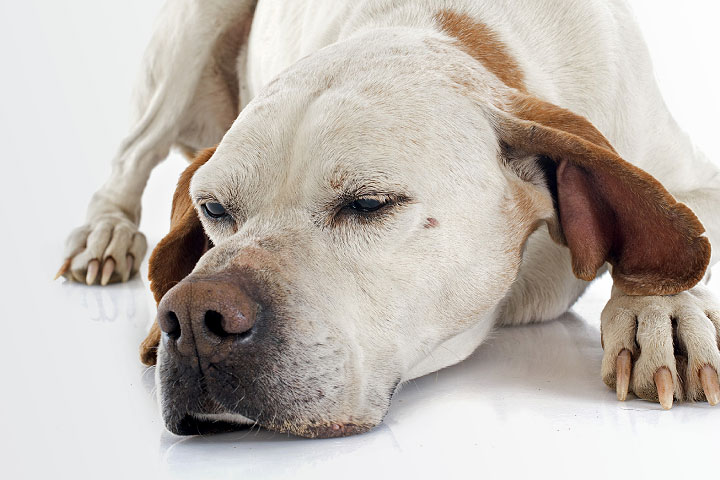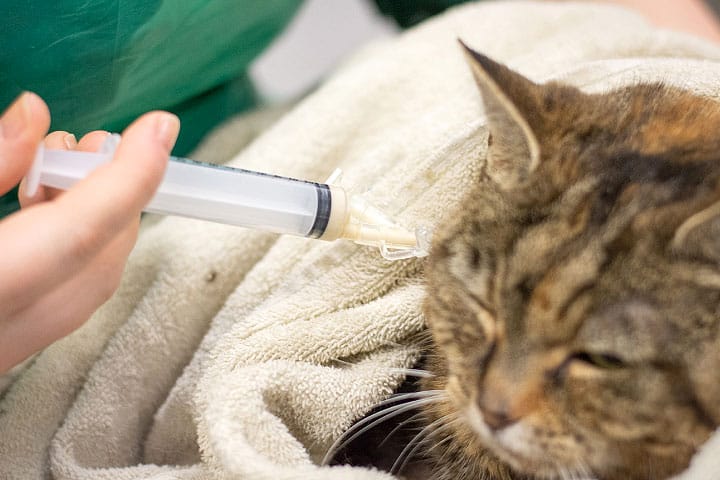
Hypoglycaemia is defined as blood glucose (BG) < 3.3 mmol/l. Patients typically present with weakness, trembling, or collapse with neurological signs varying from altered states of consciousness to seizures.
Blood glucose measurement
Note that blood taken in a serum or heparin tube must be run within 30 minutes to prevent artefactual hypoglycaemia. If sending to a reference laboratory, the serum or plasma can be separated or preferably the sample submitted in a fluoride oxalate tube. Concurrent polycythaemia can cause artefactual hypoglycaemia due to increased glucose utilisation by red cells in the sample.
Hand-held veterinary glucometers are a quick and simple way to assess BG. These can occasionally read lower than laboratory machines, therefore it is good practice to also run a sample via your in-house or reference laboratory to verify hypoglycaemia before embarking on an extensive work-up.
Emergency management of hypoglycaemia
Hypoglycaemia is an emergency and must be promptly treated with intravenous dextrose as a bolus and subsequently as a 2.5% or 5% dextrose CRI. Note that dextrose concentrations >5% should be given via a central vein due to the risk of peripheral thrombophlebitis.
What are the differentials for hypoglycaemia and how do I investigate these?
Often the diagnosis will be suspected based on the patient’s history, signalment, clinical examination findings and initial blood work. There are several differentials for hypoglycaemia:
- Neonatal/juvenile hypoglycaemia: Common complication of illness in young patients due to limited reserves.
- Toy breed hypoglycaemia: Typically affects toy breed dogs when
- Drug or toxin exposure: Excess insulin, access to owners’ oral hypoglycaemic agents (e.g. sulphonylureas like glipizide), xylitol toxicity (a commonly used sweetener).
- Insulinoma: Insulin concentration must be measured at the time of a documented hypoglycaemia event. A normal or increased serum insulin is inappropriate in the face of hypoglycaemia. Abdominal imaging to assess for a pancreatic mass is advisable.
- Congenital hepatic dysfunction: Most commonly portosystemic shunts, which will have an abnormal bile acid stimulation test and microhepatica. Glycogen storage diseases are rare and can present with hypoglycaemia and hepatomegaly, liver biopsies will confirm glycogen accumulation.
- Acquired hepatic dysfunction: End stage chronic inflammatory liver disease, or malignancy.
- Hypoadrenocorticism (Addisons) disease: Exclude with ACTH stimulation test.
- Hyposomatotropism (pituitary dwarfism): Expect stunted growth with skin and hair coat abnormalities. Genetic testing is available for German Shepherd dogs. Serum IGF-1 concentrations can be measured and expect to be low.
- Sepsis: Investigate for a pyogenic focus e.g. septic abdomen.
- Paraneoplastic hypoglycaemia: Rare but reported in a variety of non-beta cell tumours including leiomyoma and various adenocarcinomas (eg mammary, pulmonary, small intestinal). May resolve once the tumour is excised.

Case Advice or Arranging a Referral
If you are a veterinary professional and would like to discuss a case with one of our team, or require pre-referral advice about a patient, please call 01883 741449. Alternatively, to refer a case, please use the online referral form
About The Discipline
Internal Medicine

Need case advice or have any questions?
If you have any questions or would like advice on a case please call our dedicated vet line on 01883 741449 and ask to speak to one of our Internal Medicine team.
Advice is freely available, even if the case cannot be referred.
Internal Medicine Team
Our Internal Medicine Team offer a caring, multi-disciplinary approach to all medical and surgical conditions.